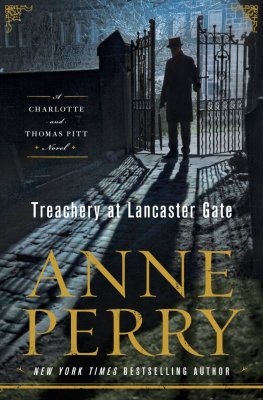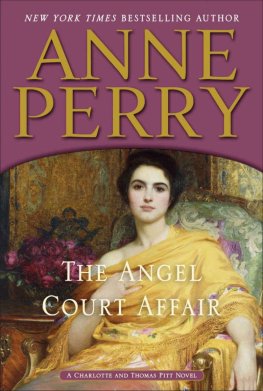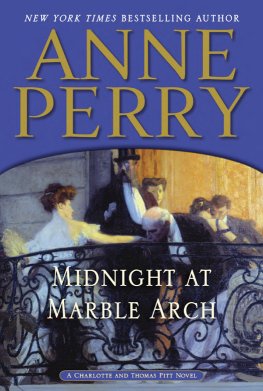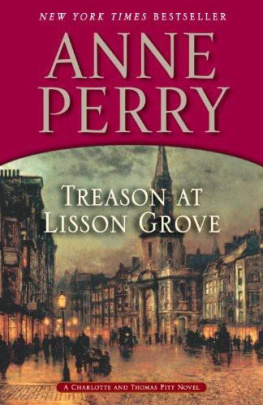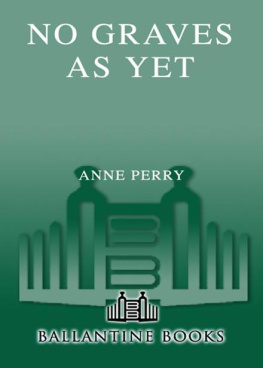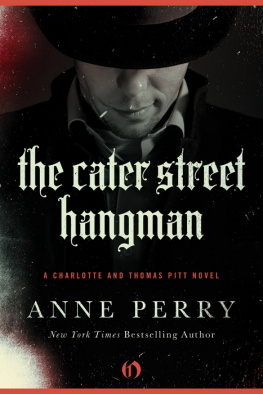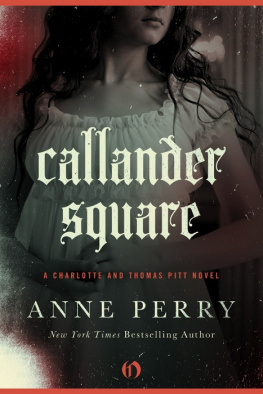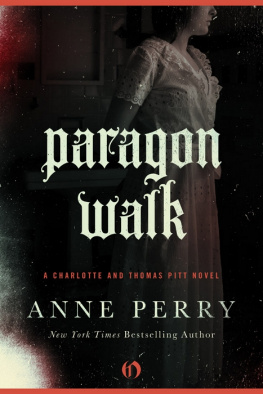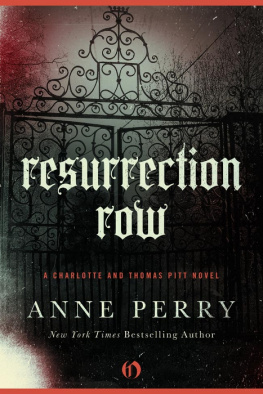BETHLEHEM ROAD by Anne Perry
Scanned by Aristotle
Hettystood at the edge of Westminster Bridgeand stared across the dark roadway at the man lounging rather awkwardly againstthe beautiful three-headed lamppost on the far side. A hansom cab passedbetween them? clattering northwards over the great span towards theHouses of Parliament on the far side, and the newly installed electric lightslike a row of golden moons along the Victoria Embankment.
The man had made no movesince she had come. It was after midnight. Such a well-dressed gentleman, withhis silk hat and white evening scarf and the fresh flowers in his buttonhole,would hardly be lounging around here waiting for an acquaintance! He must be alikely customer. What else would he stand here for?
Hetty sauntered over to him,swishing her gold skirts elegantly and cocking her head a little to one side.
"Evenin' ducky! Lookin'fer a little comp'ny, are yer?" she asked invitingly.
The man made no move at all.He could have been asleep on his feet, for all the notice he took of her.
' 'Shy, are yer?'' she saidhelpfully-some gentlemen found 1
themselves tongue-tied whenit came to the point, especially if it was not their habit. "Don' need terbe," she went on. "Nothin' wrong in a spot o' friendship on a coldnight. My name's 'Etty. Why don't yer come along wiv me. 'Ave a nice tot o'gin, an' get ter know each other, eh? Don' corst much!''
Still the man neither movednor spoke.
" 'Ere! Wot's wrong wivyer?" She peered at him, noticing for the first time that he was leaningback in rather a strained position, and that his hands were not in his pockets,as she would have expected at this time of a spring night in such chill, butwere hanging by his sides. "Are yer sick?" she said with concern.
He remained motionless.
He was older than he hadlooked from the far side of the road, probably into his fifties; silver-grayhair caught the lamplight, and his face had a blank, rather wild stare.
"You're soused as an'erring!" she exclaimed with a mixture of pity and disgust. Sheunderstood drunkenness well enough, but one did not expect it from the gentry,not in so public a street. "You better go 'ome, before the rozzers getyer. Go on! Yer can't spend all night 'ere!" No custom after all! Still,she had not done badly. The gentlemen on the Lambeth Walk had paid handsomely."Silly ol' fool!" she added under her breath to the figure againstthe lamppost.
Then she noticed that thewhite scarf was round not only his neck but round the wrought iron decorativefork of the lamppost as well. Dear God-he was tied up to it-by his neck! Thenthe hideous truth struck her: that glassy stare was not stupor, it was... death.
She let out a shriek thatcut through the night air and the deserted road with its beautiful lamps andtriple pools of light and shot up into the empty void of the sky above. Sheshrieked again, and again, as if now she had started she must continue on andon until there were some answer to the horror in front of her.
At the far side of the bridgedim figures turned; another 2
voice shouted and someonebegan to run, footsteps clattering hollowly towards her.
Hetty stepped back away fromthe lamppost and its burden and tripped over the curb, falling clumsily intothe road. She lay stunned and angry for a moment. Then someone bent over her,and she felt her shoulders lifted.
"You all right,luv?" The voice was gruff but not ungentle, and she could smell damp woolclose to her face.
Why had she been so stupid?She should have kept quiet and gone on her way, left some other fool to findthe corpse! Now a little knot of people was gathering round her.
"Gawd!" someonesquealed in sudden horror. " 'E's dead! Dead as a mackerel, poorbeggar!"
"You'd better not touchhim." This was an authoritative voice, quite different in tone, educatedand self-confident. "Someone send for the police. Here, you go, there's agood chap. There should be a constable along the Embankment."
There was the sound ofrunning feet again, fading as they drew farther off.
Hetty struggled to stand up,and the man holding her hoisted her with good-natured concern. There were fiveof them, standing shivering and awed. She wanted to get away, most particularlybefore the rozzers arrived. Really, she had not used the wits she was born with,yelling out like that! She could have held her tongue and been half a mileaway, and no one the wiser.
She looked round the ring offaces, all shadows and eerie highlights from the yellow lamps, breath makingfaint wisps of vapor in the cold. They were kindly, concerned-and there was nochance whatsoever she could escape. But she might, at least, get a free drinkout of it.
"I've 'ad an 'orribleshock," she said shakily and with a certain dignity. "I feel all coldan' wobbly like."
Someone pulled out a silverflask, the light catching on its scrolled sides. It was a beautiful thing."Have a sip of brandy?"
' 'Thank you, I fai sure.''Hetty took it without protestation and drank every drop. She ran her fingersover it, tracing the engraving, before reluctantly handing it back.
Inspector Thomas Pitt wascalled from his home at five minutes past one in the morning, and by half pasthe found himself standing at the south end of Westminster Bridge in theshivering cold looking at the corpse of a middle-aged man dressed in anexpensive black overcoat and a silk hat. He was tied by a white evening scarfround his neck to the lamppost behind him. His throat had been deeply cut; theright jugular vein was severed and his shirt was soaked in blood. The overcoathad hidden it almost entirely; and the folded scarf, as well as holding him upand a trifle backwards so the stanchion of the lamp took some of his weight,had also covered the wound.
There was a group of half adozen people standing on the far side of the bridge, across the road from thebody. The constable on duty stood beside Pitt with his bull's-eye lantern inhis hand, although the streetiamps provided sufficient light for all that theycould do now.
"Miss 'Etty Milnerfound 'im, sir," the constable said helpfully. "She said as shethought 'e were ill, an' inquired after 'is 'ealth. Reckon more like she were toutin'fer 'is business, but don't suppose it makes no difference, poor devil. 'E'sstill got money in 'is pockets, an' 'is gold watch 'n chain, so it don't lookas if 'e were robbed."
Pitt looked again at thebody. Tentatively he felt the lapels of the coat, taking off his own gloves toascertain the texture of the cloth. It was soft and firm, quality wool. Therewere fresh primroses in his buttonhole, looking ghostly in the lamplight, withthe faint wisps of fog that drifted like chiffon scarves up off the darkswirling river below. The man's gloves were leather, probably pigskin; notknitted, like Pitt's. He looked at the gold-mounted carnelian cuff links. Hemoved
the scarf aside, revealingthe blood-soaked shirt, studs still in place, and then let it fail again.
"Do we know who heis?" he asked quietly.
"Yes sir." Theconstable's voice lost some of its businesslike clarity. "I knows 'immeself, from bein' on duty round 'ere. 'E's Sir Lockwood 'Amilton, member o'Parliament. 'E lives somewhere souf o' the river, so I reckon as 'e was goin''ome after a late sittin', like usual. Some o' the gennelmen walks of a finenight, if they lives close, an' a lot o' them do, wherever they're a memberfor.'' He cleared his throat of some impediment, perhaps cold, perhaps amixture of pity and horror. "Could be some town the other end of thecountry. They 'as to 'ave a place in town w'en the 'ouse is in session. And o'course them as is 'igh in government 'as ter be 'ere all the time, 'cept fer'olidays and the like."
"Yes," Pitt smiledbleakly. He already knew the customs of Parliament, but the man was trying tobe helpful. It was easier to talk; it filled the silence and drew one's mindfrom the corpse. "Thank you. Which one is Hetty Milner?"
Next page

